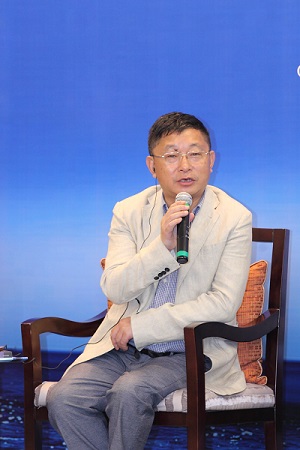阿来:文学就是一个充满流动性的地域

文学就是一个充满流动性的地域
参加类似的讨论,我喜欢即兴发言,平时的感受加上现场同行们发言的触发——无论是正面的还是反面的——都会产生一种激活效应,使人产生新鲜的想法。但是,没有办法,不同语言间的交流似乎取消了这种可能性,虽然早就有人倡导世界的文学,但不同的语言还是构成了不同的文学世界。在悉尼参加第三次中澳文学论坛时,一位澳洲作家坦率地说,在他的经验中,世界文学其实就是英语文学。有人觉得这是自大或者狭隘,但我觉得这样的坦诚相当可爱,其实是说出了某种真实的情形。而好些中国作家面临的是另外情形,如果你只是在中文世界得到读者的欢迎与敬重,这不算成功。我们急于把所写的文字变成另外的语言,特别喜欢跑到世界各地去参加类似今天这样的讨论,并预先把要说的话翻译成别的语言。以至于有外国的批评家跑到中国来说,中国作家不行的原因就是因为不懂得外国语。我想,他们肯定不会对在本国对本国语言的作家说这样的话。我最近正在写一部长篇小说,主角是上个世纪一位到中国探险的植物学家。小说像一部交响曲有大小不一的主题,主题之一就是想探讨一个在本国也就是本身生活的地域中低调严谨的人为什么到了另一个地域——一个有着明显文明落差的地域就会变得自大与狂妄?
我已经不止一次提醒过自己,要少参加一些这类的活动,但今天还是来了。并预先为了翻译提前写好了这个发言。
我要说,今天会议要讨论的这个题目设计太好了。好到什么程度呢?因为“文学”,“流动”,“地域”三个词完全覆盖了我写作与阅读经验的方方面面。
地域是空间,流动当然会在某个或大或小的空间里发生,以诗人为例,真正走遍大地的中文有李白和苏东坡,英文有惠特曼,西班牙文有聂鲁达。大范围的流动造就了宽广的表现空间。也有很少出门的诗人,或者出了门也行之不远,只去街口的杂货铺卖点日用品的狄金森,这是美国人。中国也有这样只处于狭小空间中的诗人。那是一个王妃叫花蕊夫人。她著名的诗句“君在城头竖降旗,妾在宫中那得知?”说得是,她深锁后宫,连他的国王丈夫在外面战败投降了也不知道。流动性很差,但照样造成了一个含义丰厚的空间。而在这或者广大或者狭隘的地域中,他们都造就了非常伟大的文学空间。在大小不一的空间中表现出了特别的人生。不仅塑造了自己的人生,而且在某种程度上还在影响着我们这些人今天的人生。
比如,借谈论他们来支撑我们今天的写作或眼下这种谈话的合理性。
这个题目还可以倒过来看:“文学”,“流动”,“地域”。
这也是构筑文学世界的另一种方法。
这让我想起了印度裔的英国作家奈保尔。他为了文学,为了写作重返父亲的祖国印度。二十六年间回去了三次,写成了三本书。他这是为了文学而流动。从欧洲流动到南亚次大陆。到了印度,他继续流动,从南到北,从发达的城市到凋敝的乡村;他流动,在不同的个人和社会群体之间,不同种姓,不同宗教,不同族群之间。三本书从不同的侧面写出了那个地域的不同方面。这个变化中的地域。这个充满可能性也充满困境的地域。这个地域是物理的,是物质的,也是精神的与文化的。
关于流动,奈保尔说:“作为一个作家,我的世界充满飞行,以及未完成的经验……”
关于地域,他说:“作者用了二十六年时间,超越个人发现与痛苦,展开分析,最终抵达那个简单且无比强烈的经验:印度是重要的。”
关于文学,他说:“我并没有将自己所见全部写出来。我把那些经验储存起来,然后产生一个想法,我要扩展那段经历,完成一个大部头,里面充满了人,这个关于印度的全景式描述将在一个广泛的意义上涵盖或者解释这个国家未来二十年或三十年将发生什么。”
所以,关于这个题目,我是不能说出什么新鲜的东西了。
所以,我再一次提醒自己,如果不能完全杜绝,以后也要尽量少参加这样的活动。这似乎是文学研究者们的专业。
我要做的,是更多地在自己的地域中流动,观察,体悟,书写。
我所书写的地域是青藏高原。这个地域与整个世界相映照,有着过于强烈的文化与地理上的异质性,全世界都愿意将其当成一个例外与奇迹。看待这个地域时,难免都有苏珊•桑塔格所指认过的那种“奇观化”的倾向。很多人愿意把那里当成一个例外。当作世界最大的奇观。把那里当成一个化外之地。我的工作就是书写这个地域,这个地域上的人群中所发生的一切,都处于前所未有的变化之中,而这些变化也是这个正在急剧变化的世界的一个部分当这个世界的很多号称文明的人更愿意将其与整个世界割裂出来,当成另一个世界。所以,我的这种努力当然会受到质疑。记得在瑞士一个城市朗读我一部小说《尘埃落定》德文版的时候,一个看起来非常善良的女士对我说,你把西藏写得如此野蛮令我非常痛心,西藏怎么可能有如此严酷的刑罚?因为我的书中写一个人因为不当的言行被割掉了舌头。也是这本书在英国的朗诵会,不得朗诵结束,一个愤怒的英国人涨红着脸冲上台来,抗议我污蔑了达赖喇嘛神圣的宗教。因为我写到了寺院里僧人用暴力反对在拉萨开办一所英文学校。这是一个真实事件,1946年,英属印度驻拉萨的代表提出这个办学建议,这所学校开办半年后,因为寺院方面强烈反对而被迫关闭。所以,今天关于青藏高原的写作,绝大多数时候并不是一个文学问题,甚至也不是一个政治问题,而是一个我不知道是什么问题的问题。这种写作的困难放在这里讨论似乎也没有什么意义。依佛教的观点,就是这个世界的很多人其实需要“正知正见”。当然,这个号称文明的世界也没有蒙昧到人人都如此的程度。前年去澳大利亚的时候,《Burnt ground 》杂志主编就送来他主编的这本刊物上刊发的我的小说,并称赞我的敏锐与勇气。澳大利亚也出版过我的长篇小说。尽管如此,将某个地域符号化,或者如一些僧人所做的一样,将这个地域符咒化的现象还在那些自认文明的人群中普遍存在。对于人类理性而言,这是一种罪恶。文化的预设使这种罪恶滋生,意识形态的先入为主助其泛滥。
这种地域的偏见一旦形成,流动也就消失不见了。
社会在时代大潮中的流动被视而不见。固守了这种认知的人们,他们的智识的变化至少在这个局部上就不再启动。
当然,结果就是没有面对现实的文学,而只是奈保尔所说的“幻象”。
问题是,整个文明世界为什么有那么多人要在已然发生着剧烈变化的青藏高原拼命维持这样一种幻象?
流动正在全球不同程度地发生。没有任何一个角落成为例外。流动是物质的,也是观念的,更是情感的。这是现实,也是文学积累下来的普遍的经验。在全球化的背景下,文学又被赋予了不同文化不同语言间深度对话的功能。或者说,在全球化背景下,这个功能被空前放大。但对话的基础是平等,是相互尊重。还是以印度为例。以英语书写中的印度为例。吉卜林所写的印度与奈保尔所写的印度间就存在着巨大的差异。这种差异所彰显的正是人类智识的进步。
今天的中国,正以前所未有的开放态度向着世界敞开。这不仅是这个国家的政府所采取的经济开放政策。更重要的是,从一百多年前的新文化运动开始,中国包括作家在内的知识分子群体,就已经向着世界全面开放。到今天,在很多时候,在中国,一个作家成就的衡量,并不是以其用中文这种语言表达中国这个地域的各种经验是否充分,而是以其在西方世界的别种语言中是否受到欢迎为标准的。如果我们把中国文学的真实现状与西方呈现的中国文学图景相比,无疑有着巨大的偏差。这种情形对我本人是一个提醒。人都生活成长于不同的地域,无论流动性增加到什么程度,这种由地域规定的语言与现实经验还是一个根本性的东西,至少在现在看来就是如此。世界文学的时代并没有真正到来。那么,我要做的工作首先是构建自己的世界,而不是过于急迫地走向另外的世界。因为这种急迫可能使我们会以别人的标准去扭曲自己丰富的,自有风范的,并且可能日趋圆满的世界。在我看来,文学,是为了呈现一个流动的地域。文学家,以此方式加入世界的对话,而不是为了在对话中受到欢迎,而去捏造或扭曲一个地域。
(有关奈保尔的引文全部出自《百万叛变的今天》序章《虚构与非虚构》。)
Literature – A Region Filled with Mobility
A lai
When I participate in a discussion of this kind, I like to speak spontaneously and reveal my personal feelings and ideas inspired by other speakers, be it positive or negative, because it gives rise to fresh ideas. But it is impossible for me to do so on some occasions when my audience speaks a different language. Although many people have been advocating a type of literature belonging to the whole world, different types of literature emerge in different languages. When I attended the third China-Australia Literary Forum in Sydney, an Australian writer said frankly that in his experience, English literature could be considered as a literature belonging to the whole world. Some people think that his idea is arrogant or narrow, but I quite appreciated his candid idea and thought it revealed some truth. Some Chinese writers are faced with something else. You are not a successful writer if you are only received and respected among Chinese readers. We are eager to translate our works into another language, so we go around the world to attend relevant meetings, and translate the speeches we are going to deliver in advance. But some foreign critics say that Chinese writers are lousy because they cannot speak foreign languages. I don’t think they would ever say such harsh words to a writer from their own countries. I have been working on a novel recently and the protagonist is a botanist who explored China last century. The novel is similar to a symphony because it also covers different themes, one of which is to discuss how a person who keeps a low-profile in his native country becomes arrogant when he moves to a less developed place.
I have reminded myself more than once to join fewer such activities, yet here I am. I even wrote this speech beforehand to be translated.
I would like to say, the discussion topic for today’s meeting is truly great. But to what extent? “Literature” “mobility” and “region” - these three words cover every aspect of my writing and reading experience.
A region is a space where mobility, large or small, certainly happens. Take poets as examples. Poets travelled over the land, including Li Bai and Su Dongpo who wrote in Chinese, Walt Whitman who wrote in English, and Pablo Neruda who wrote in Spanish. Mobility in a large region contributes to wide space for expression. There are also poets who seldom walk out of the door or never travel far away from home even when they leave the house, such as Dickinson, the U.S. poet who only went out to shop down the street for daily necessities. There are also Chinese poets who put themselves in limited spaces, such as Lady Huarui. Her famous line “High on the wall the king waved the flag of surrender, deep in the palace how could I know?” illustrates how she was confined within the palace and did not know her husband the king had been defeated and surrendered to the enemy. Although there was a lack of mobility, space with rich meaning was still created. Within either wide or narrow regions, they all created great literary spaces, and represented special lives in spaces of different sizes. They not only shaped their own lives, but also, to some extent, influenced our lives today.
For example, we can support the reasonability of our writings today or our current conversation by talking about them.
The topic can also be seen the other way around: “literature,” “mobility” and “region”.
This is also another way to construct the literature world.
I am reminded of Naipaul, the Asian-Indian British writer who went back to India, his father’s homeland, to pursue writing. Three trips to India were made in 26 years, and three books were written. For the sake of literature, he flew from Europe to the South Asian Sub-Continent, from the south to the north of India, and from advanced cities to shabby countries. He flew among various individuals and social groups, castes, religions and ethnic groups. The three books tell various aspects of the region from different perspectives – it is a changing region filled with possibilities and dilemmas, a region of substance, spirit and culture.
For mobility, Naipaul said: “As a writer, my world is filled with flights and unfinished experiences…”
For region, he said: “The author spent 26 years, went beyond personal findings and pains, carried out analyses, and finally had a simple yet remarkably strong experience. India is important.”
For literature, he said: “I didn’t write down all my findings. I stored those experiences, and had an idea: I want to expand the experience and write a tome depicting different persons. The panoramic description of India would cover or explain in wide meaning about what would happen in the next 20 or 30 years in the country.”
Therefore, there’s really nothing new I can say about this topic.
I reminded myself again to attend fewer such activities, which seemed meant for literature researchers.
What I need to do is move, observe, taste and write more in my own region.
The territory I write about is the Qinghai-Tibet Plateau, a region casting light on the whole world with its excess cultural and geographical heterogeneity. Therefore, the world regards the region as an exception and a miracle. When seeing the region, it is inevitable to think of Susan Sontag’s “spectacle”. Many people are willing to regard the region as an exception, the largest wonder of the world, and an uncivilized place. My work is to write about the region. Unprecedented changes are taking place here, part of a rapidly changing world. Many so-called civilized people are more willing to separate the region from the rest of the world and regard it as another world. Therefore, my efforts would certainly be questioned. I remember one time when I was reading a novel of mine – the German version of The Dust Settles – in a city in Switzerland, a seemingly kind lady said to me: “I’m heartbroken seeing that you wrote Tibet to be such a barbarous place. How could such severe punishment even exist in Tibet?” I wrote in my book that in Tibet a person’s tongue was cut out for inappropriate words and deeds. I failed to complete a reading from the same book in the U.K. when an angry and blushed British person rushed onto the stage, protesting that I slandered the sacred religion of the Dalai Lama, because I wrote in the book that monks of a temple used violence to protest the opening of an English school in Lhasa. The event is real. In 1946, a representative of British India in Lhasa proposed to open such a school, which, after half a year since its establishment, was forced to close because of strong protests. Therefore, writing of the Qinghai-Tibet Plateau today most of the time is not a matter of literature or politics. Instead, it’s a matter the nature of which I’m not aware. Such difficulties in writing seem to be meaningless for discussion here. From a Buddhist viewpoint, many people need the “right understanding and right view”. Of course the so-called civilized world is not so ignorant. When I visited Australia the year before last, the editor-in-chief of Burnt Ground sent me my novel published in the journal that he edited, and praised my keenness and courage. My other full-length novels were also published in Australia. Still, symbolizing a certain region like some monks did still prevails in those regarding themselves as civilized. For human rationality, this is a kind of sin. Prediction of culture leads to breeding of the sin, while preconception of ideology contributes to overflow of the sin.
Once the regional prejudice forms, mobility disappears.
Mobility in society is ignored. Changes in the wisdom and knowledge of people firmly holding such cognition would no longer be launched, at least in this aspect.
Of course, the result is that no literature faces up to reality, and only Naipaul’s “phantom” remains.
The question is, why are there so many people desperately maintaining the phantom in the Qinghai-Tibet Plateau, a place already undergoing so much dramatic change?
Mobility happens to a different extent around the globe, and not a single corner would be left out as an exception. Mobility is physical, ideological, and especially emotional. This is reality, and also a common experience accumulated in literature. In this age of globalization, literature is also endowed with the function of deep dialogue between various cultures and languages. Or, the function is unprecedentedly amplified in this age of globalization. However, the foundation for dialogue is equality and mutual respect. Again, take India, especially India in English writings, as an example. India under the pen of Kipling is dramatically different from India under the pen of Naipaul. Such difference manifests the very advancement of wisdom and knowledge of human beings.
Today’s China is opening itself with an unprecedentedly welcoming attitude. It does not solely come from the economic opening-up policy that the government has adopted. More importantly, ever since the New Culture Movement over a hundred years ago, groups of intellectuals in China, writers included, had already completely opened themselves up to the world. Today, the appraisal of a Chinese writer’s achievement does not depend on whether he/she has adequately and with sufficient experience used Chinese to express China as a region. Instead, the standard is whether his/her works, when written in other languages, are popular in the West. If we compare the real situation of Chinese literature with Chinese literature presented in the West, we would find a huge deviation. This is also a reminder to me. People live and grow in different regions; no matter how much mobility grows, language and real experience regulated by regions remain fundamental, as least for now. The age of world literature has not really arrived yet. My work would start by constituting my own world instead of rushing off to another world, as such urgency may lead us to warp our rich, self-styled and gradually complete world. In my opinion, literature is to represent a mobile region. Litterateurs join the world’s dialogue in this way, rather than to fabricate or warp a region so as to be popular in the dialogue.
(References of Naipaul all come from Fiction and Non-fiction, prologue of India: A Million Mutinies Now.)


